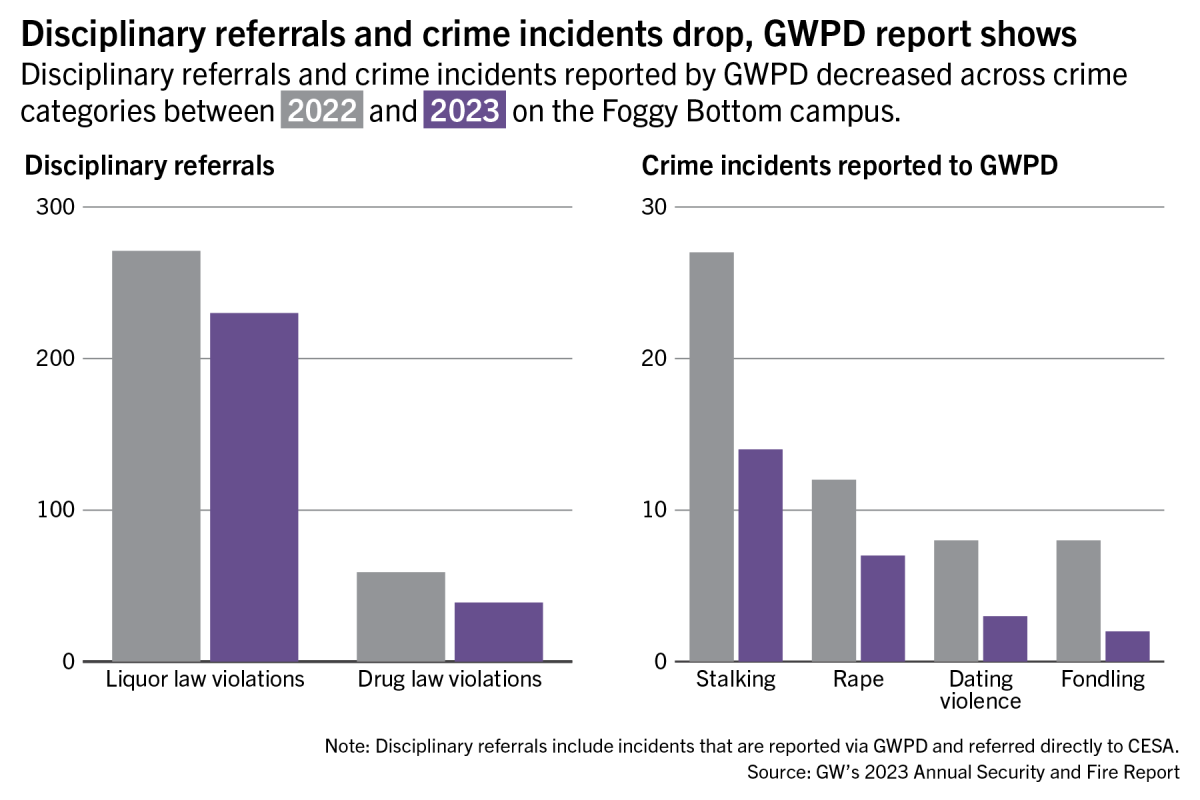Disciplinary referrals to the GW Police Department for liquor laws and drug law violations on campus plummeted from 2022 and 2023, according to GW’s Annual Security & Fire Safety Report.
The report — which colleges that receive federal funding are required to publish each year under the Clery Act — shows that the number of liquor law violations referred by GWPD to the Office of Conflict Education & Student Accountability dropped 15 percent between 2022 and 2023 — from 271 to 230 violations on the Foggy Bottom Campus — and the number of drug law violations dropped 34 percent — from 59 to 39 violations on the Foggy Bottom Campus. Experts in crime data said they suspect the drop indicates that fewer students are reporting crimes on campus because the report only reflect incidents that people report to GWPD.
The report also states reports of sex crimes like rape, fondling and dating violence nearly halved between 2022 and 2023 on the Foggy Bottom Campus, dropping from 12 to seven, eight to two and eight to three, respectively. Reports of fires and the value of property damaged from the fires between 2022 to 2023 on the Foggy Bottom Campus dropped from an estimated $3,400 to $34,191 across nine fires to an estimated $200 to $2,097 across three fires.
Vice President for Safety and Operations Baxter Goodly said GWPD will continue working to support and protect the GW community. He declined to comment on why reports of liquor and drug violations, sex crimes and fires dropped in 2023 and whether officials think the fewer reported violations reflect a trend of fewer overall violations on campus.
“GWPD prioritizes the safety of our university community, and continues to employ all necessary resources to address issues as they arise,” Goodly said in an email. “The department will continue to strive to meet the evolving needs of the community and foster a safe campus environment for all.”

The Clery Act requires college campuses to collect and publish data on reported criminal offenses that occurred on campus each year, and data must include crimes reported by the GW Police Department and documented criminal offenses, liquor and drug law violations, violence against women and hate crimes.
The decline in disciplinary referrals for liquor law and drug violations on the Foggy Bottom Campus from 2022 to 2023 followed a spike of 405 combined disciplinary referrals issued for liquor law and drug violations from 2021 and 2022, which experts last year attributed to increased activity on campus when campus returned to in-person learning following the COVID-19 pandemic.
Disciplinary referrals for liquor law violations at the Mount Vernon Campus dropped from eight to five reported cases between 2022 to 2023, while disciplinary referrals for drug violations dropped from 30 to six reported cases, according to the report.
GWPD officers made six arrests on Foggy Bottom for drug offences in 2022, and they made no arrests in 2023 on the Foggy Bottom and Mount Vernon campuses, the report states.
Reported sex crimes on the Foggy Bottom Campus dropped to its lowest since returning to campus following the University shutdown during the COVID-19 pandemic from March 2020 to January 2022, according to the report. Reports of rape decreased from 12 reported cases in 2022 to seven reported cases in 2023 on the Foggy Bottom campus, while reports of fondling dropped from eight reported cases in 2022 to two reported cases in 2023.
Reports of dating violence dropped from eight to three reported cases, and reports of stalking nearly halved, decreasing from 27 to 17 between 2022 and 2023 on both campuses. The number of documented reports of domestic violence in 2023 remained unchanged from 2022, with only one documented case for both years, per the report.
Laura Egan, the senior director of programs at the Clery Center, said the Clery Report provides a standard way for students and employees at colleges and universities to compare crime on their campus to national data.
“This provides consumers of higher education with a clearer picture of what violence looks like on that campus and what the campus is doing to both prevent and respond to it,” Egan said.
Georgetown University reported 64 disciplinary referrals for alcohol in 2023, in comparison to 60 reported the year prior. American University did not specifically list the number of disciplinary referrals for alcohol in 2022 and 2023.
American experienced a slight increase in reported stalking cases, from two cases in 2022 to three cases in 2023. In contrast, GW and Georgetown’s main campus experienced a decrease in reported stalking cases in 2023, with only 17 and 13 incidents recorded at each institution, down from 27 and 23 incidents, respectively, in 2022.
Matthew D’anna, an adjunct professor of criminology at American and George Mason universities, said the reduced number of reported cases could reflect changes in a university’s reporting protocol, policies or communication from officials.
“Given the low numbers, it’s going to be very tricky and arguably impossible to attribute that to a larger scale trend or symptomatic of other types of activity that are going on in the area,” D’anna said.
While reported cases of violence against women have decreased, D’anna said reported crimes do not account for all crimes on campus like off-campus crimes.
“The biggest caveat to all of these data is that they are reported crimes, and so it, there’s always going to be challenges to reporting of persons crimes,” D’anna said. “’You’ve got people that go to that university or a part of that university that then potentially are operating outside of the actual limits of campus.”





